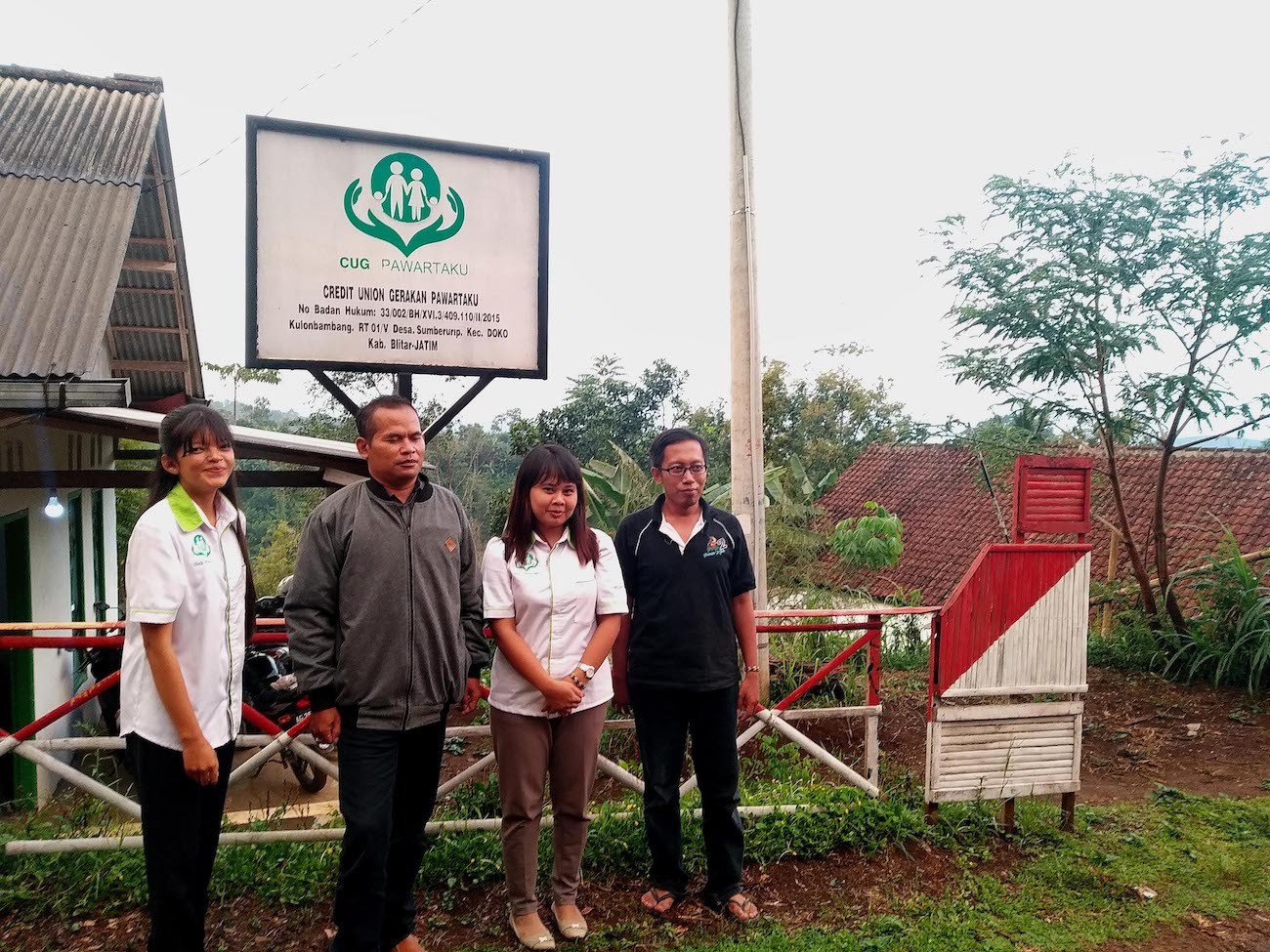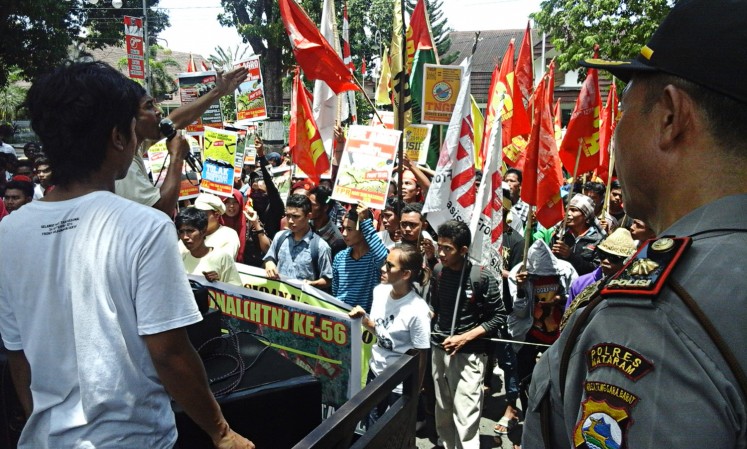Popular Reads
Top Results
Can't find what you're looking for?
View all search resultsPopular Reads
Top Results
Can't find what you're looking for?
View all search resultsEast Java farmers form credit union to break ‘curse’ of lifetime labor
Other farmers use their land as collateral to borrow from banks, but Pawartaku members do not have to deal with banks to ensure healthy cashflow.
Change text size
Gift Premium Articles
to Anyone
A
group of farmers in Blitar, East Java, have established a member-owned financial institution. Its main goal is to keep ownership of the land they obtained from a plantation company through redistribution.
The farmers, members of the Pawartaku farmers association in Banyuurip village, Doko district, which is located some 30 kilometers northeast of Blitar, founded the Pawartaku Credit Union in 2013, a year after they received land ownership certificates from the government for the farmland redistributed from plantation company PT Saribumi Kawi.
“Many of our fellow farmers in other villages who had obtained land ownership from the land redistribution scheme lost their valuable assets to the banks for being unable to pay their debts,” Pawartaku Credit Union head Tukinan, 46, said. “We, members of Pawartaku, don’t want to lose our farmland and become farm laborers again.”
Other farmers use the land as collateral to borrow from banks, but Pawartaku members do not have to deal with banks to ensure healthy cashflow.
Pawartaku is acronym for Paguyuban Warga Tani Kulonbambang (Kulonbambang Farmers Association), named after the Kulonbambang hamlet.
The ‘curse’ of being laborers
Pawartaku members were once workers at Saribumi Kawi, commonly known as the Kulonbambang plantation. Their parents and grandparents were also workers at the plantation, which had a concession of about 1,000 hectares of land on the slopes of Mount Kawi. It produced cloves, tea and coffee.
Tukinan himself was a third-generation Kulonbambang plantation worker. His grandfather and grandmother, Suko and Maryam, had been laborers at the plantation when it was under European ownership during the Dutch colonial era. His father, Suwaji, spent his entire life at the plantation.
“Families of plantation workers live under a set of company rules and values that mean we can hardly escape the curse of being plantation laborers for generations,” said Tukinan.
PT Saribumi Kawi, owned by a local businessman, took over the Kulonbambang plantation from its European owner after Indonesian Independence in 1945.
However, the rise of Soeharto’s New Order regime in the late 1960s, which used the military as its political backbone, marked a new phase of ownership for many plantations. Significant amounts of land were taken by military figures or those who had links to the military. The Kulonbambang plantation, under PT Saribumi Kawi, became the property of a middle-ranking military officer, Let. Col. Suripno, in 1969.
Demanding land redistribution
However, the 1998 Reform Movement, which led to Soeharto’s resignation, encouraged plantation workers in Blitar, including Kulonbambang plantation workers, to become the masters of the land.
Tukinan, after finishing university in Surabaya, returned to his village and helped Kulonbambang plantation workers organize their movement. In Blitar, he met with former student activists who advocated for land reform. These included Farhan Mahfuzi, a key figure of the land reform movement in Blitar who co-founded Aryo Blitar Farmers Association (PPAB). Farhan, a former student activist in Yogyakarta during his study at Gadjah Mada University (UGM), is now the manager of the Pawartaku Credit Union.
The roles Tukinan, Farhan and the PPAB played were important in organizing the Kulonbambang plantation workers movement to demand land redistribution.
In 1999, workers demanded Saribumi Kawi pay their Idul Fitri holiday bonus (THR). Later, they made other labor rights demands that the company said it could not fulfill. When Saribumi Kawi’s cash flow was eventually affected by workers’ strikes, an agreement was reached that allowed the workers to cultivate part of the farmland as compensation for the company’s inability to pay their salary.
“Since then, the issue of land redistribution has been unstoppable,” said Tukinan.
After years of protests and negotiations, the National Land Agency (BPN) issued a land redistribution decree that granted the farmers 319 hectares taken from the Kulonbambang plantation concession area. The land was then distributed among some 500 plantation-worker households.
Pawartaku collectively owns 50 hectares of redistributed land. The yield from the collective farmland is used to finance the credit union’s needs, including a total fund of Rp 400 million transferred to the credit union for its initial capital.
The credit union has helped farmers develop their livelihood without having to borrow money from the banks.
“With the yield from the collective land, we are also planning to build facilities for farmers such as an agricultural research center,” said Tukinan.
Ripples of land reform
The legal basis for land reform in Indonesia was defined in 1960, during president Sukarno’s era, in Agrarian Law No. 5. However, the end of Sukarno’s regime saw the reform agenda halt. During the 32 years of Soeharto’s presidency, the issue was untouched, even though the law remained on the books.
Activists, students and farmers call on the government to carry out land reforms in a rally in Mataram, West Nusa Tenggara. (JP/Panca Nugraha)Land reform movements, after Soeharto’s resignation, emerged in 25 other places in Blitar regency, a regency where 30 percent of the land is controlled by plantation companies and state-owned Perhutani. Plantation workers and small farmers, with farmers association PPAB’s support, demanded that the government and private companies redistribute some of the land under farmers’ tillage.
Farmer protests turned into physical clashes in some areas. In the Branggah Banaran clove plantation in Sidorejo village, Ponggok district, a clash between plantation workers and local police in June 2000 left two farmers dead and dozens of others injured.
A year after the incident, a group of farmers in Karanganyar village, Nglegok district, received a redistribution of 182 hectares of land. In 2002, another group of farmers was granted 200 hectares of farmland in Banyuurip village, Wonotirto district.
Of the 25 groups of farmers and plantation workers who demanded land redistribution, only six of them have won concessions, including the group in Kulonbambang.
Banks confiscating land
Farhan, through the PPAB, learned that the farmers he and other activists had helped win land had offered the land as collateral for bank loans.
In Karanganyar village, a few years after a group of farmers in the village had won land from a plantation company in 2001, Farhan said, PPAB noticed that state-owned BRI had disbursed a total loan of Rp 11 billion to them.
“And the end of the story is that 60 percent of the loan was declared non-performing, meaning that about 60 percent of the land they received from land redistribution was confiscated by the bank and auctioned off,” Farhan said. “This could be bad for the future of the land reform movement in Indonesia.”
The case of the Karanganyar farmers has encouraged Farhan, Tukinan and Kulonbambang farmers to found their own financial institutions from which members can borrow money with a much lower risk of losing their most valuable assets.
Growing union
Generally, a credit union works like a cooperative; it is owned collectively by its members, and its financial services are exclusively for its members.
In March 2013, the Pawartaku Credit Union was founded with Rp 50 million of initial capital coming from the yields of Pawartaku’s collective farmland. Now, the total fund deposited to the credit union by the Pawartaku farmers association is Rp 400 million, making the total assets of the union, combined with members’ monthly installments, Rp 3.8 billion. About 70 percent, or Rp 2.4 billion, of the fund has been circulating among members in loans.
“Now the credit union has a total of 786 members, not only from Kulonbambang but also from other groups of farmers affiliated with the PPAB,” Farhan said.
He said that the practical concept of the Pawartaku Credit Union was mostly adapted from similar a credit union developed by a traditional Dayak community in Kalimantan.
The Pawartaku Credit Union applies higher interest rates for both loans and savings: 1.8 percent and 1.5 percent monthly respectively. However, Farhan said its members felt safer taking out loans from the union as debt rescheduling was a possibility if borrowers faced difficulty paying monthly installments.
“Borrowers who are in arrears with monthly installments less than 12 months overdue always have the option to reschedule,” he said.
Farhan said that, so far, the Pawartaku Credit Union had experienced three cases of non-performing loans in which it had to confiscate the debtors’ collateral land. “The solution to the cases was that the bad debts were taken over by the association and the confiscated lands became collective land where the former owners could still work.”
Other important financial services provided by Pawartaku include the farmers’ pension package. Members who join the pension program are required to pay fees of Rp 50,000 per month over a period of 30 years. Those who complete the program will have monthly pension fund of about Rp 3.5 million. “This program is aimed at preventing farmers from selling their land once they reach an unproductive age.”
Future of land reform
Farhan said the success of Credit Union Pawartaku and the willingness of the farmers’ association to reserve some land for collective use would define the future of land reform in Blitar and other places in the country.
Referring to a 2018 National Statistics Agency (BPS) survey in 2018, he said about 60 percent of the 27.2 million agricultural households in Indonesia were small farmers who, each, owned less than 0.5 hectares of land.
“According to former BPN head Joyo Winoto, 56 percent of land in Indonesia is owned by 0.2 percent of all Indonesian citizens,” he said, adding that Joyo Winoto and his policy had marked an important milestone in the country’s land reform progress in the post-New Order regime era.
He said maintaining the sustainability of land reform was important in a country where almost 60 percent of poor families lived in villages and worked in the agriculture sector. (evi)











